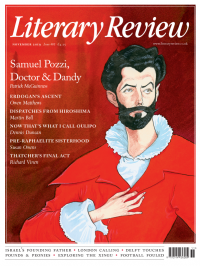Elain Harwood
Ring Road Nation
Boom Cities: Architect-Planners and the Politics of Radical Urban Renewal in 1960s Britain
By Otto Saumarez Smith
Oxford University Press 198pp £65
The only thing wrong with Otto Saumarez Smith’s book is its title. Far from booming, at the start of the 1960s the towns and cities of the Midlands and the north of England, and their Welsh, Scottish and Irish counterparts, were dirty, despoiled monuments to a bygone age, from which the young and talented fled south. After more than a century of being out of step, London was reasserting its traditional dominance and defying all attempts to restrict its growth. Leicester, for instance, relatively prosperous among Midlands cities, saw the steady decline of its traditional hosiery and shoe industries from the 1950s onwards. In such towns, industry and retail became concentrated in the hands of a few large-scale businesses.
One solution to these problems lay in the local authorities’ own hands. Their income from industrial rates was limited by government controls, while the population exodus from city centres reduced the number of residents paying domestic rates. But most authorities had large central landholdings, perhaps a wholesale or retail market (or both), an abattoir, a tram shed or a council depot ripe for redevelopment for commercial purposes. Furthermore, the land acquired for inner ring roads made more sites available for shops and showrooms. A town could reinvent itself by attracting fashionable chain stores and supermarkets, reached by broad new roads, with car parking close at hand.
Commercial developers quickly saw the opportunities available to them in helping local authorities realise their dreams. They could build on a larger scale than individual shopkeepers and even fund the construction of hotels – the ultimate prize for any local authority seeking to bring trade and cachet to

Sign Up to our newsletter
Receive free articles, highlights from the archive, news, details of prizes, and much more.@Lit_Review
Follow Literary Review on Twitter
Twitter Feed
Margaret Atwood has become a cultural weathervane, blamed for predicting dystopia and celebrated for resisting it. Yet her ‘memoir of sorts’ reveals a more complicated, playful figure.
@sophieolive introduces us to a young Peggy.
Sophie Oliver - Ms Fixit’s Characteristics
Sophie Oliver: Ms Fixit’s Characteristics - Book of Lives: A Memoir of Sorts by Margaret Atwood
literaryreview.co.uk
For a writer so ubiquitous, George Orwell remains curiously elusive. His voice is lost, his image scarce; all that survives is the prose, and the interpretations built upon it.
@Dorianlynskey wonders what is to be done.
Dorian Lynskey - Doublethink & Doubt
Dorian Lynskey: Doublethink & Doubt - Orwell: 2+2=5 by Raoul Peck (dir); George Orwell: Life and Legacy by Robert Colls
literaryreview.co.uk
The court of Henry VIII is easy to envision thanks to Hans Holbein the Younger’s portraits: the bearded king, Anne of Cleves in red and gold, Thomas Cromwell demure in black.
Peter Marshall paints a picture of the artist himself.
Peter Marshall - Varnish & Virtue
Peter Marshall: Varnish & Virtue - Holbein: Renaissance Master by Elizabeth Goldring
literaryreview.co.uk